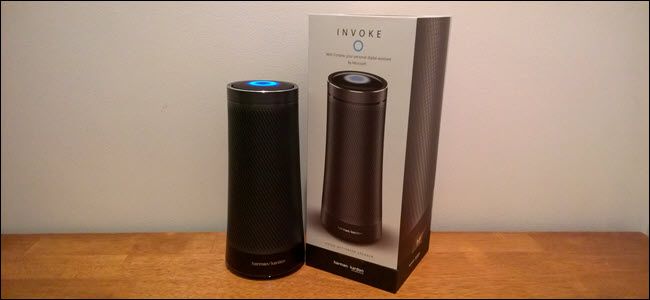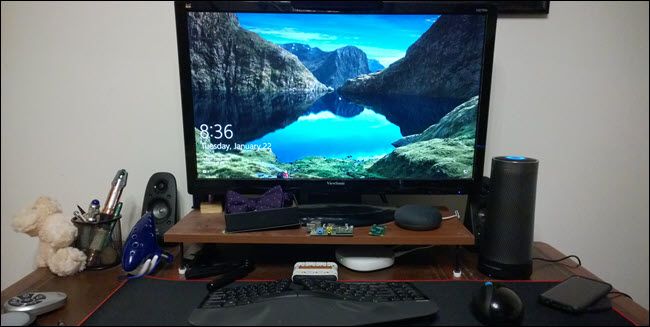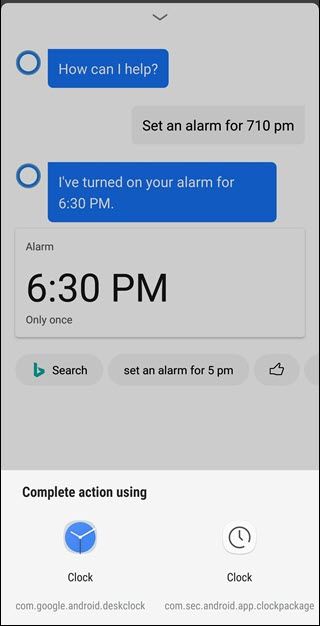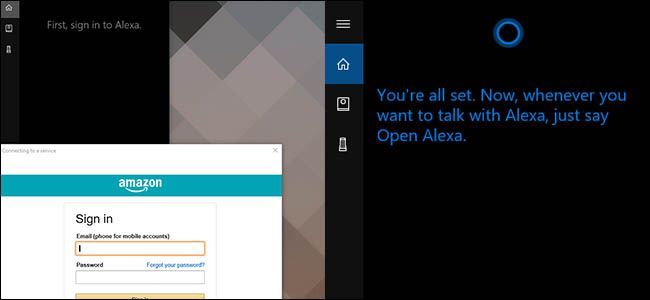Quick Links
I spent days using Cortana instead of Alexa or Google Assistant and the experience left me feeling as rough around the edges as Cortana is. Unfortunately, Microsoft has fallen so far behind that the only reasonable solution is to give up.
Satya says Goodbye to Cortana Speakers
Recently, Satya Nadella, the CEO of Microsoft, has said he no longer sees Cortana as a competitor to Alexa or Google Assistant. According to MSPoweruser, he stated:
“You should be able to use it on Google Assistant, you should be able to use it on Alexa, just like how you use our apps on Android and iOS so that’s at least how we want to think about where it’ll go.”
But, is Cortana so far behind? Is it time to head in a new direction and give up on Cortana being your dedicated digital household assistant? I spent a few days trying to determine just that, and what I found is: Yes, this is the right decision to make.
Set Up Was Complicated
When I started with this experiment, I immediately ran into an issue. I have Alexa devices and Google devices scattered through my home. But I don't have Cortana devices so conveniently placed. I own a Surface Pro 3, a Windows 10 PC, and I put Cortana on my phone. But my PC doesn't have a microphone, my Surface spends much of its time turned off these days, and my phone doesn't have a decent enough microphone for quick voice commands.
So I acquired a Harmon Kardon Invoke for my office (where I spend a lot of my time) and used my phone in other locations in the house. It's not a perfect one-to-one scenario, but good enough. Unfortunately, there is no Google Home Mini or Echo dot equivalent, just the Invoke. So cheaply placing Cortana speakers around the house is out of the question. The price of the Invoke has dropped to $50, which is very low for a such a great sounding speaker, but you can get Echo Dots and Google Minis for less. If you keep an eye out, it's not uncommon to see them for as little as $30.
Cortana Does Half the Basics Well Enough
My primary use for my Google and Alexa devices are smart home controls, music, timers, and routines that automate things. When it came to Smart Home integration, I thought I was doing well at first. Cortana has Wink, Smartthings, and Philips Hue integration. I'm currently using a Wink hub for many of my smart home devices and Philips light bulbs, and controlling those devices worked without issue. The experience with most of my smart home devices was on par with Alexa or Google Assistant.
Cortana continued well with easy to set timers and alarms, and adding Spotify was a simple process that seemed to work well. At least it did until I wanted to stop the music. About half the time, saying "Stop" or "stop the music" didn't work. Cortana would tell me she couldn't do that right now. If I tried a few more times, it would eventually work. Calling up playlists was equally problematic. Despite the wrong name, saying "play the blind forest on Spotify" correctly pulled up my Ori and the Blind Forest playlist, but saying "play Ori and the Blind Forest" confused Cortana every time. I found it easier to control the music from the Spotify app than through voice interactions.
Conversely, as long as I get the name of the song or person right, I seldom if ever see these sort of issues with Google Assistant and Alexa with Spotify.
More Features are Missing than Present
The problems started with my living room. The lights in my living room are Magic Home devices, and Cortana has no integration for those. Then I realized my smart outlets are either iClever or GE devices, and while the GE devices have Wink integration, the iClever devices do not. So I can't turn on the lights in my living room, nor can I control most of my smart outlets with Cortana. I had to fall back to Alexa or Google for that.
Sometimes the music I like isn't on Spotify, in which case I turn to another source. Unfortunately, the music service selection for Cortana is minimal. There's no Pandora for instance, despite their promise that it would come more than a year ago. Pandora hasn't updated its news blog with any further mention of Cortana, even when it last updated the Xbox app. Even with Spotify, Cortana doesn't have multi-room audio at all, which is a feature I use regularly. And if I wanted an intercom, it was back to Alexa or Google. The problem isn't just that I don't have Cortana speakers throughout my house, those features don't exist.
I have my email and Calendar integrated through Outlook.com, so these should have been a snap. And while my email did work well, my calendar left much to be desired. "Cortana, what's on my calendar" and "what's my next appointment" led to responses about nothing being on the calendar today. But I was looking for tomorrow. So I tried "what's on my calendar tomorrow" and after two attempts that finally worked. Unfortunately, the information I received wasn't helpful because of packages.
Anytime I receive an email about a shipment on its way, Microsoft helpfully adds it to my calendar on the expected arrival day. Frustratingly, asking Cortana "when is my package arriving" yields no results. My calendar lists five packages arriving tomorrow, and Cortana will only read the first four items on the list. Which means my actual appointment (the sixth item) for tomorrow wasn't listed.
Calendar appointments also revealed that Cortana doesn't work consistently across devices. The event for tomorrow has a reminder set for today. When that reminder happened, it hit my Android phone, my Windows phone, my PC, and my Surface. But nothing happened on the Invoke. If other devices hadn't been in the same room, I might have missed the reminder altogether.
The Cortana App Doesn't Help Much
I make extensive use of routines to automate my home. I considered switching them over to Cortana for a complete experience, but at the beginning of the process there just wasn't a routines option for Cortana. Halfway through, an update occurred, and Microsoft introduced features very similar to routines called Scenes and Rules. Scenes can combine actions--- if the kitchen lights turn off, turn down the thermostat to 70 degrees. Rules make actions happen at certain times --- at 9 pm turn on the porch light.
I thought I found my path to automation, but again I quickly discovered Microsoft had only implemented this feature halfway. You can only set Scenes and Rules with your voice. If you dig into the Cortana app settings (where Microsoft moved notebooks), you can see and delete existing Scenes and Rules, but you can't add them. At that point, I threw up my hands and gave up. I have too many routines to add by voice.
Alarms and timers are equally a problem. You can't name them, whether you use the app or voice, and if you create one from the Cortana speaker, you must remove it using the speaker. Since you can't name it, that means saying something like: "remove my 4:30 pm alarm" and hoping Cortana understands you. If I set one on my phone, it went to the clock app. Although, when I did that, it didn't get the time right despite the fact I was using the typing option.
The simple fact is, Google and Amazon have done a much better job of app integration here. I can control reminders, alarms, and timers for any of my devices from their respective app. And I can set up routines by tapping my phone's screen without talking to those devices in a simple easy to use fashion.
Very Few Skills Exist, and They're Confusing to Turn On
When Microsoft announced the Invoke, it boasted that 46 skills already existed on Cortana. Since then that number has grown to over a hundred. But that's infinitesimal compared to Alexa's 50,000 skills. And while not every Alexa skill is impressive, many of them are at least trying to do something unique, like read a story or facilitate a board game. Cortana barely has the basics covered with the likes of Dominoes, Dark Sky, and Wink.
But the worst part is trying to add a skill. You can find skills you have already installed in the Cortana app. But clicking on the "Discover More Skills" option takes you to the Cortana Skills webpage, where you can click on a skill to get a description. But there's no add button, install option, or anything els to suggest how to enable it. Microsoft expects you to try to use the skill by speaking to Cortana, at which point you'll be prompted to add it.
But you have to know the skill exists in the first place, which means you will inevitably end up at this webpage---so why not just let us turn it on from there?
The Most Powerful Thing You Can Do with Cortana is Turn Her Into Alexa
Every time I ran into an issue with using Cortana, the answer was pretty simple: Call Alexa. In keeping with my "only use Cortana devices" promise, I didn't take the easy way out. Instead, I called up Alexa through Cortana using their new integration. I am pleased to say this worked great. Most of the time within two seconds I heard the Alexa ding to let me know she had taken over, and then I could speak the command I needed. After my request went through, Alexa would ask if there was anything else. When I finished, I could either say "stop listening" or say nothing at all. Eventually, she would time out.
But as tight as that integration is, it's still a slightly delayed step when you could just use an Alexa speaker in the first place. If voice assistant speakers are about convenience, then it only makes sense to go straight the virtual horse's mouth and skip the delay.
Cortana is Stuck in Time
Nearly every issue I have encountered with Cortana was once an issue with Alexa and Google Assistant.
They didn't always account for multiple speakers, nor did they have multi-room audio. They lacked refinement in their apps and routines weren't present in the beginning. But Amazon and Google have worked to improve their offerings, and to be frank, Microsoft hasn't. At least not in a consumer-focused fashion. They may have shown off futuristic office workplace demos, but that doesn't do you or me any good at home.
Could Microsoft catch up? Yes probably, but at what cost? Microsoft is a large corporation with a lot of irons in the fire, and every time it focuses on a resource here, it loses focus somewhere else.
The truth is, even if Microsoft did add all the features that Cortana is currently missing, that wouldn't solve the problem that Microsoft seems to face all too often. Low adoption means third-party support is lacking, but missing third-party support means low adoption. Microsoft is facing the same chicken and egg problem it saw with Windows phone, and that's why there are so few Cortana skills. No one is interested in developing them.
At some point, the best thing to do is change course and ask a new question. What else could Cortana be? And that's what Satya Nadella was getting at with his recent statements.
In the meantime, I'm going back to Alexa and Google. I'll keep the Cortana Speaker around for Spotify integration, but likely not much else. Even if the voice response doesn't improve, I can keep it next to my PC and control it from the Spotify app or just use it as a Bluetooth speaker. And to be fair, it's a pretty good-sounding Bluetooth speaker for $50.





